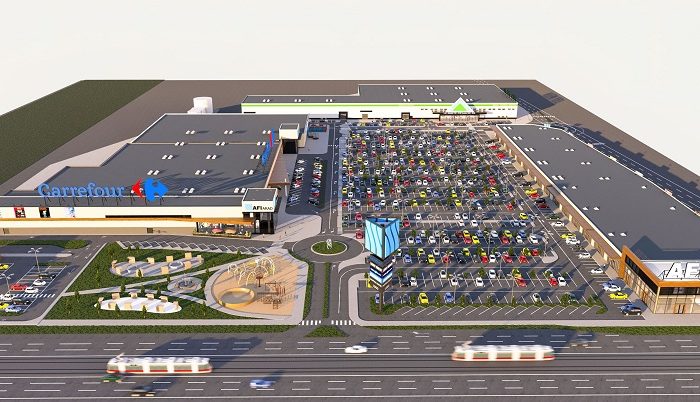Local land market continues to see significant interest, but zoning legislation blockages are pushing developers to abandon purchase plans in Bucharest

The land market remained active in the first half of 2022, maintaining trends seen in the past couple of years which marked the best levels since 2007. Residential developers remain quite actively oriented towards areas just outside of Bucharest, where the land offering is plentiful, prices are smaller and permits are obtained without challenges, reveals Colliers in its market report on the evolution of the real estate market in the first semester of 2022.
Residential is still seeing the strongest focus, but with sharply higher interest rates, inflation chipping away at purchasing power and uncertainties plaguing the near-term outlook, Colliers consultants expect a slowdown in sales in the second half of the year.
Supply remains adequate, with quite a few companies seeking to sell their assets for brownfield/urban regeneration projects. On the demand side, Colliers consultants noticed a robust market liquidity so far this year, with only a minor negative impact from external events like the Russian invasion of neighboring Ukraine or the episodes of turmoil in global financial markets. Also, retail developers’ land purchase intention remains as strong as it was in the recent past, with new project plans particularly outside the Capital.
“We are even seeing new entries in this sector, particularly among local players. That said, following years of hefty expansion, this retail submarket may not be a straight home run as it was in the past, with a large number of small and medium-sized towns already targeted for retail parks, but there is still a lot of untapped room that just requires a more careful approach. Just to exemplify, Romania and Poland have similar consumption levels per capita and while Poland is roughly two times larger than Romania in terms of population, its modern retail stock is around 3.5 times larger than Romania’s.”, says Sînziana Oprea, Director Land Agency at Colliers.
Further, Colliers consultants expect to see large transactions in various parts of the country, less so in Bucharest, as investors turn to other big cities for large scale projects, besides the interest for retail parks in smaller towns. At the same time, interest for land plots within the boundaries of Bucharest is likely to peter off, meaning that the share of regional cities in total land sales is expected to increase, compared to recent years when the Capital usually accounted for three-quarters of the market.
Meanwhile, office developers remain a limited presence on the market, but Colliers consultants point out that if the current leasing recovery proves sustainable, the segment could see a gradual return over the following quarters. However, with the current situation in Bucharest, office developers might also face a very difficult task in finding land plots that would allow for a project to start sooner than, say 3 years, given the zoning-related issues.
An interesting trend that Colliers consultants have noticed in the market is the arrival of industrial developers in urban settings, notably in Bucharest, likely chasing future in-city logistics projects, sometimes competing with other “traditional” developers for such locations (residential, retail). Given the very limited modern warehouse projects for last-mile or small business units we have and the booming e-commerce scene during the last decade, we will likely see more deals like these.
Another important aspect to keep track of are legislative changes with regards to taxation, particularly given the tight fiscal situation faced by the Romanian government. Property taxes are set to rise sharply, while VAT legislation is changing to become less supportive for the purchase of residential properties. This should also negatively impact the residential sector, currently the biggest demand-side force for land sales.
During the first half of the year, prices have been constant, with only case-by-case changes either upwards or downwards. Colliers consultants noticed that developers have tried to coax landowners into offering some discounts, particularly as they are facing sharply higher construction costs, yet for now, no or very limited concessions have been made by the sellers. Otherwise, land plots with zoning in place continue to sell at a hefty premium compared to similar plots which do not benefit from this, with the premium exceeding 20-30 percent in many instances.
With a cautiously optimistic approach to the overall macroeconomic climate, however, Colliers consultants are not overlooking the significant impact that the rising cost of risk/loans is having on overall investor sentiment as well as the heightened risks of a recession hitting Romania eventually.
“Consequently, we could start seeing some instances of land price adjustments as activity could slow down in the second part of 2022 and through 2023, even though this should not be generalized. To a certain extent, the construction activity is also set to slow on account of aforementioned factors, as well as higher construction costs and, for Bucharest in particular, the fogginess regarding future zoning. We still have no clear view on the Bucharest situation other than that it seems like it will not be a quick fix, which means that there will be upside pressures on the price of existing assets requiring zoning, which, in turn, could lead to affordability issues and reallocation of capital resources. On the other hand, the assets with valid urbanistic plans and permits will remain highly attractive and liquid”, concludes Sînziana Oprea, Director Land Agency at Colliers.













